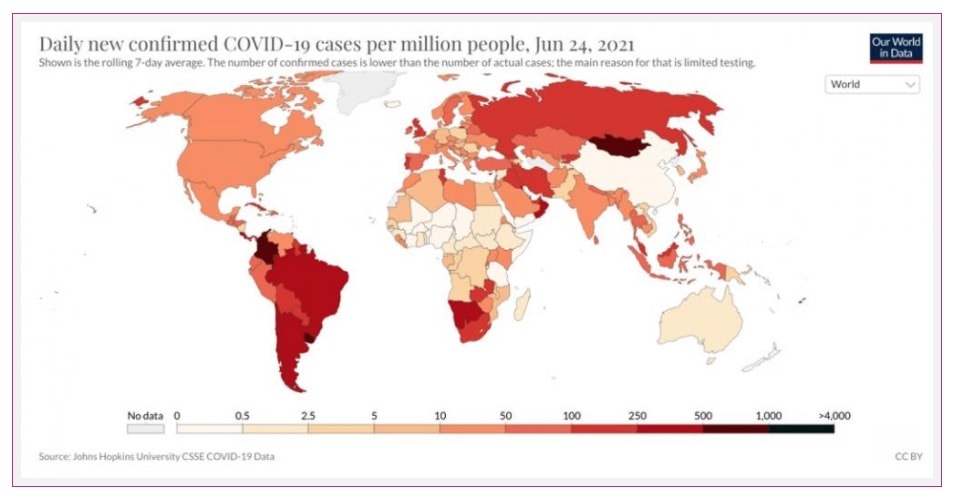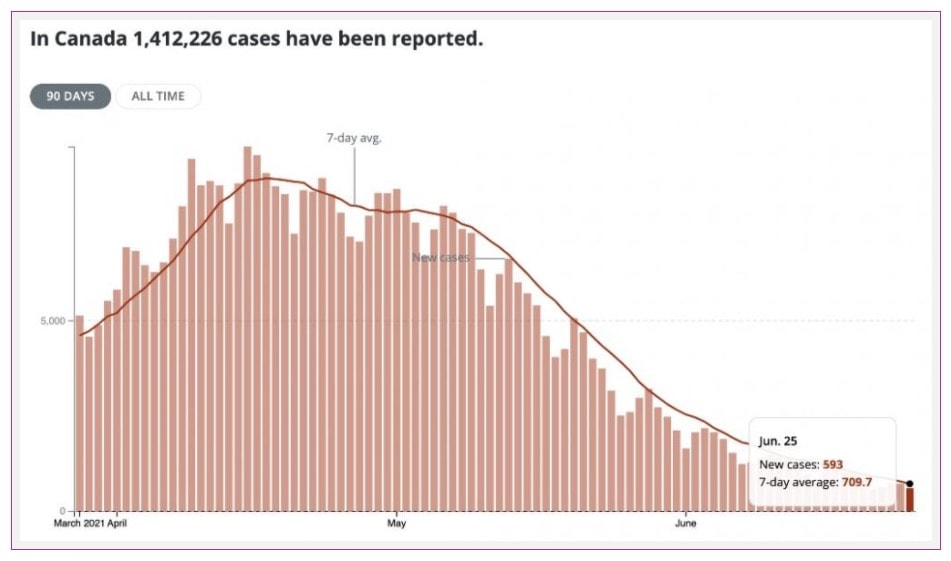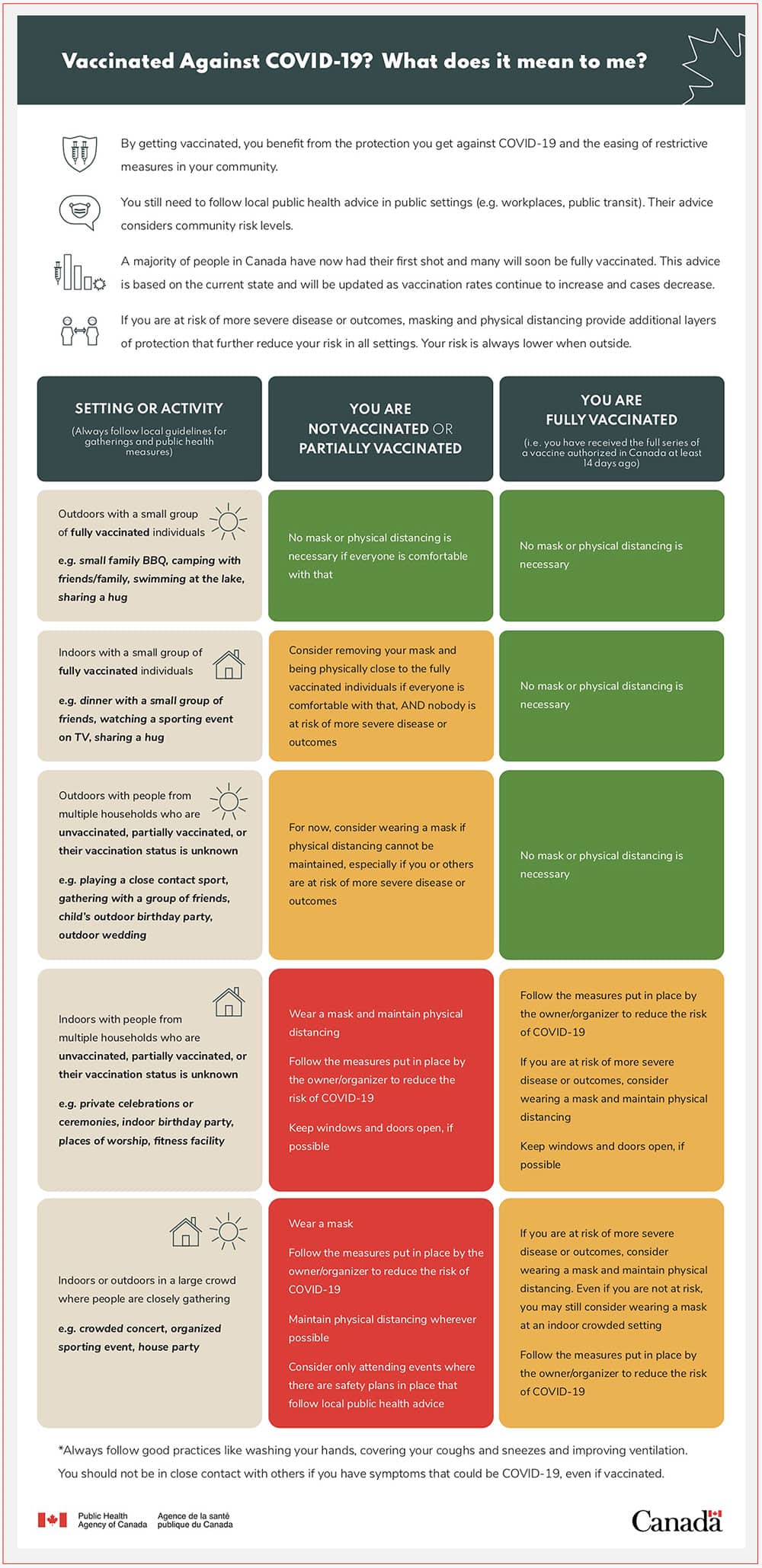Well, hello friends,
Welcome to another COVID-19 update.
Thanks for all the lovely feedback each week – I truly appreciate it.
Please share with family and friends. I hope to disseminate more facts and stop the perpetuation of fear-mongering fiction out there.
Let’s review the bad news, the good news, the most common question of the week, and my silver lining.
The bad news
180.1 million cases of COVID-19 had been reported around the world, with 3.9 million deaths.
In Canada, we have seen over 1.4 million cases, with over 26,000 deaths.
While we are faring well in Canada, there are still many outbreaks around the world.
Indonesia and South Africa are struggling with a resurgence of cases, threatening to overwhelm their hospitals. Even my example of the country that has managed the best in COVID, Australia (Sydney), has an outbreak of the Delta variant.
Israel, certainly a world leader in COVID-19 vaccination, is requiring people to wear masks indoors again amid a new outbreak. This is very important, as they have vaccinated 85% of the adult population. Israel had previously lifted almost all restrictions as new cases plummeted.
The head of the World Health Organization has announced that the Delta variant is “the most transmissible of the variants identified so far”. The Delta variant has been detected in at least 85 countries.
The WHO director-general, Tedros Adhanom Ghebreyesus, said last week, “We are starting to see increases in transmission around the world…more cases mean more hospitalizations … which increases the risk of death.”
Two COVID-19 vaccine doses appear to provide strong protection against this variant. Still, there is an ongoing lack of access to vaccines in developing countries, leaving much of the world extremely vulnerable.

We worry that the unchecked circulation of COVID-19 could lead to the emergence of even more troublesome variants. The WHO said, “Right now our public health and social measures work, our vaccines work, our diagnostics work, our therapeutics work” “But there may be a time where this virus evolves, and these countermeasures don’t.”
The Public Health Agency of Canada has also expressed concern about the delta variant, saying it could lead to a larger-than-expected resurgence in cases this fall.
Dr. Dina, what’s the good news?
Cases in Canada continue to decrease.

More than 34.6 million COVID-19 vaccine doses have been given in Canada.
The Public Health Agency of Canada released a chart with recommendations of how people should approach social situations, depending on whether they received one, two, or no COVID-19 vaccines.
For example, they suggest people who are fully vaccinated don’t need to wear masks or maintain physical distance while indoors with a small group of other fully vaccinated people. This includes having small dinner parties, watching a sporting event together indoors, or even hugging without wearing a mask.
People who have received one dose can consider removing their masks indoors with small groups of fully vaccinated people if no one present is at risk of severe COVID-related illness.
Click here to download the chart below.

Question of the week
If I received a Pfizer vaccine, and it is not available, can I receive a Moderna vaccine? Or vice versa?
Both mRNA COVID-19 vaccines used in Canada (Pfizer and Moderna) work the same way, have similar side effect profiles, and are both very effective against COVID-19 infection, hospitalization, and death.
It is essential to complete the vaccine series with a second dose of a COVID-19 vaccine to ensure optimal protection. Increased spread of the Delta variant emphasizes the need to get a second dose. One dose simply isn’t enough to protect from COVID-19.
The National Advisory Committee on Immunization (NACI) recommends that, if available, the same mRNA vaccine should be offered for the second dose. However, if the same mRNA vaccine is not readily available (such as in the current limited supply of Pfizer vaccines), another mRNA vaccine is recommended to complete the series. The previous dose is still counted, and there is no need to start again.
Both Pfizer and Moderna vaccines work the same by using the spike protein of the COVID-19 virus as the antigen. This leads to an immune response, so the body sees the virus as foreign and fights it if the individual is exposed.
Due to a limited supply of Pfizer vaccines right now, Toronto vaccine clinics may be administering the Moderna vaccine to people 18 years of age and older as this vaccine is interchangeable with the Pfizer vaccine.
Adolescents aged 12-17 will continue to receive the Pfizer vaccine as it is the only vaccine approved in Canada for this age group.
Did you miss last week’s
“More on COVID-19 vaccine side-effects“
My silver lining of the week
My kids are done school for the Summer. And this means less screen time.
I am over my kids being on screens all day, every day.
They are over it too. It is too much.
They, and I, am looking forward to more active time outside, more sunshine, and less staring into the computer.
Have a fabulous week, everyone.
Stay healthy and safe,


![[Dr. Dina News] IMPORTANT UPDATE re. VIRTUAL CARE](https://drdina.ca/wp-content/uploads/2021/01/dr-dina-kulik-kids-and-virtual-care-1a-400x250.jpg)
![[Dr. Dina News] COVID-19 Vaccine for Infants and Young Children.](https://drdina.ca/wp-content/uploads/2021/04/dr-dina-kulik-kids-and-vaccines-400x250.jpg)
![[Dr. Dina News] COVID-19 Vaccine for Infants and Young Children.](https://drdina.ca/wp-content/uploads/2022/04/DRD-1-400x250.jpg)






